Wise words for Friday 13 January 2023published at 04:30 GMT 13 January 2023
Our proverb of the day:
Quote MessageWhen told to find its ancestors, the leather goes to the cattle farm."
An Oromo proverb from Ethiopia sent by Abdu Aba.
Our proverb of the day:
Quote MessageWhen told to find its ancestors, the leather goes to the cattle farm."
An Oromo proverb from Ethiopia sent by Abdu Aba.
We'll be back on Friday morning
That's all from the BBC Africa Live team until Friday morning.
In the meantime, you can find the latest updates on the BBC News website, or listen to our podcast Africa Today.
A reminder of our African proverb of the day:
Quote MessageCarelessness in small things leads little by little to ruin."
A Luganda proverb sent by Ndereya Mukasa in Kampala, Uganda.
Click here to send us your African proverbs.
And we leave you with this photo of a mother and child in Maputo, Mozambique by Grég Escande.
Allow Instagram content?
This article contains content provided by Instagram. We ask for your permission before anything is loaded, as they may be using cookies and other technologies. You may want to read Meta’s Instagram cookie policy, external and privacy policy, external before accepting. To view this content choose ‘accept and continue’.
The Energy Regulator of South Africa (NERSA) has allowed the beleaguered power utility Eskom to raise its tariff by nearly 19%.
This is despite the country currently facing up to 10 hours a day of load shedding as the state-owned company struggles to keep the lights on. The increase will come into effect in April.
While the 18.65% rise falls short of the 32 % that Eskom had originally asked for, cash-strapped South Africans are unhappy paying more for an unreliable service.
The unpopular tariff increase comes after Eskom implemented continuous stage 6 rolling blackouts this week.
Eskom, which is reported to have lost $890m (£730m) last year, is plagued by aging infrastructure, mismanagement and corruption allegations.
Its outgoing CEO, Andre de Ruyter who resigned last month, recently announced he survived an assassination attempt at his office after drinking coffee from a cup laced with cyanide.
 BBC World Service
BBC World Service
A court in Tunisia has jailed nine members of what is described as an all-woman terrorist group.
They were accused of planning to kill a government minister.
Two of the women said to be the ringleaders were sentenced to 25 years in prison, while the others received sentences ranging from three to 14 years.
The case dates back to 2016 when there were reports on social media of an attempt to assassinate the then Interior Minister Hedi Majdoub during a visit to his parents.
His office denied the reports. The Tunisian justice minister has not divulged further information.
 Ameyu Etana
Ameyu Etana
BBC Afaan Oromoo
 Image source, Getty Images
Image source, Getty ImagesIt is reported that some of the inmates ended up in nearby police stations, but the number is not clear
Ethiopian security forces in the southern part of the country have intensified a hunt to arrest hundreds of inmates who escaped a prison in Bule Hora town, more than 450km (280 miles) from the capital Addis Ababa, following an attack by armed men.
''Government forces are still searching,'' deputy mayor of the town Girja Urago told the BBC.
The prison was home to notorious inmates, including members of rebel groups who were arrested following military operations.
The attack, which happened early in the morning on Sunday, left five police prison guards and one civilian dead, authorities told the BBC.
''All of them have escaped. We estimate there were more than 480 inmates,'' the official said.
Oromo Liberation Army rebels have been blamed for the attack but there is no immediate comment from the group.
In the past, militant groups have claimed to have released ''political prisoners'' from other jails in the populous region of Oromia - home to Ethiopia's Prime Minister Abiy Ahmed.
 Peter Jegwa
Peter Jegwa
Lilongwe, Malawi
 Image source, Getty Images
Image source, Getty ImagesCholera causes vomiting and a runny stomach
Malawi authorities say students who were prevented from returning to school at the end of the Christmas holidays due to fears of an escalating cholera outbreak can now return.
Health Minister Khumbize Chiponda announced in Lilongwe that most schools are now prepared to manage the cholera situation.
Malawi is facing a devastating outbreak pf the water-borne disease which has so far killed more than 750 people.
The Presidential Task Force on Covid-19 and Cholera had ordered that schools in the capital, Lilongwe, and the southern commercial city of Blantyre should not open in order to protect learners and students from contracting cholera.
The decision drew criticism from education rights activists because it only targeted schools in two cities while those in other areas, including some that had also recorded high number of cholera cases, were allowed to open.
Mr Chiponda has now said that over the past two weeks the task force has been monitoring the situation and is satisfied there is availability of water, handwashing facilities and clean toilets in all schools, hence the decision to order their re-opening.
Richard Kagoe
BBC News, Nairobi
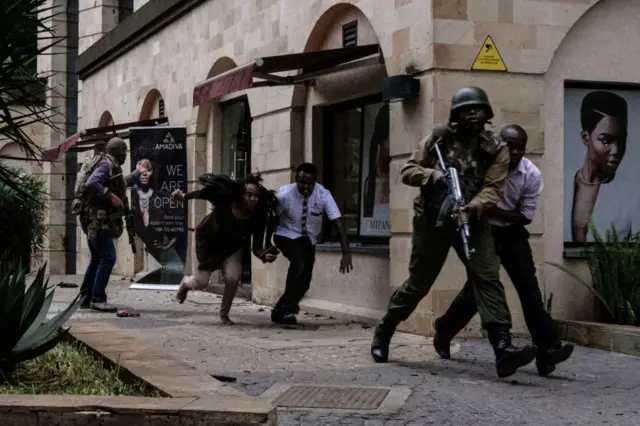 Image source, AFP
Image source, AFPPeople had to be evacuated after bombs were detonated during the attack
The US government has offered a $10m (£8m) cash reward for information about Mohammud Abdi Aden, the alleged mastermind of the 2019 attack on a hotel and office complex in the Kenyan capital, Nairobi, in 2019.
Mr Aden was allegedly part of the cell that planned the DusitD2 hotel attack, which resulted in the deaths of 22 people.
The Somalia-based militant group al-Shabab said it carried out the assault.
The US says Aden is wanted alongside other suspected militants.
The reward is offered with the full support of Kenyan authorities.
Several people accused of playing various roles in the run-up to the attack have been arrested and arraigned in court. But no-one has been convicted on charges linked to the attack.
Earlier this week, the US offered a $10m bounty for any leads on Maalim Ayman, the leader of al-Shabab’s military wing in Kenya.
He is wanted for his alleged role in the attack of an army base hosting Kenyan and US forces near the border with Somalia.
The US has been a key ally of Kenya on the war against terror.
Al-Shabab has carried out several attacks in Kenya saying they were in retaliation for sending troops into Somalia in 2011 as part of the African Union mission to fight the militants.
Read more on the attack:
 Peter Jegwa
Peter Jegwa
Lilongwe, Malawi
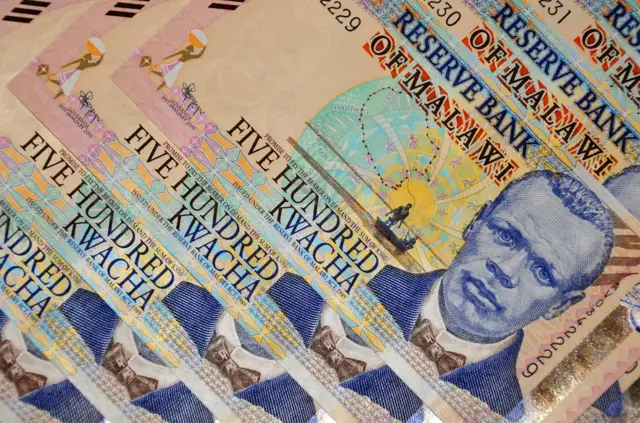 Image source, Getty Images
Image source, Getty ImagesMalawi's Central Bank says printing new bank notes to replace old and damaged ones is costly
Malawi police have arrested two women in their mid-20s after they used kwacha bank notes as decorations for a cake they had baked and posted it on social media.
A police spokesman said the pair had posted the image of the cake festooned with 70 500-kwacha notes - worth $35 (£28) on social media as they advertised their cake-making business.
The accused have not commented on their arrest but police say they will be charged with an offence of “damaging and unlawful use of currency”.
In the past, Malawi’s central bank has said it incurs huge costs printing new bank notes to replace worn out ones and blamed improper use of bank notes as one of reasons the notes have to be regularly replaced.
The offence of “damaging and unlawful use of currency” carries a large maximum fine.
Allow X content?
This article contains content provided by X. We ask for your permission before anything is loaded, as they may be using cookies and other technologies. You may want to read X’s cookie policy, external and privacy policy, external before accepting. To view this content choose ‘accept and continue’.
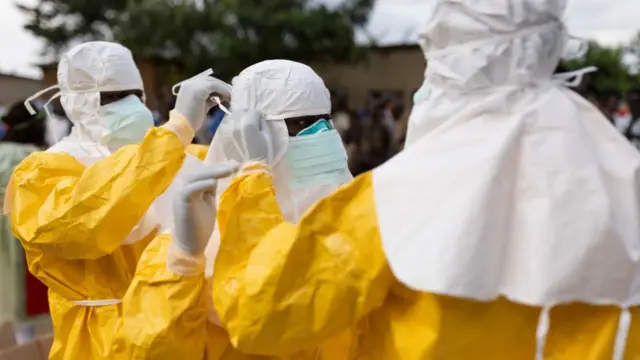 Image source, Getty Images
Image source, Getty ImagesDozens of people died in the current outbreak
A survivor of Ebola in Uganda has told the BBC’s Newsday programme that he and his family were treated like pariahs as they battled the illness.
“Many of our neighbours had rejected us,” he said. “No-one could sit close to you, you could not go to the shops.”
He did not even have the support of his neighbours when members of his family died, he said.
"Imagine losing someone and none of your neighbours could come to check on you, no one even comes to say sorry for your loss."
The experience was so traumatic, he said, that he felt hopeless: “It got to the point where I was so tired and hated this world.”
On Wednesday, Ugandan officials officially declared the end of their recent Ebola outbreak, after a 42-day period without any new confirmed cases.
More than 50 people died from the illness in the recent outbreak. Health officials were able to quash the disease by imposing lockdowns in high-incidence areas.
Ebola spreads through bodily fluid and is a deadly illness with a high fatality rate.
 Image source, Getty Images
Image source, Getty ImagesAfrica currently has no functional rocket-launch facility, a space expert says
Djibouti’s plans to build Africa’s first rocket-launch facility is a “very important” step because presently there is no functioning one on the continent, Temidayo Oniosun, the managing Director of the consultancy firm Space in Africa, has told the BBC’s Newsday programme.
His comments come after the country signed a preliminary agreement with a Chinese space firm to build a $1bn (£800m) rocket-launch site.
Under the deal, the satellite-manufacturing company Hong Kong Aerospace Technology Group will manage the site for the first 30 years and then it will pass to Djiboutian hands.
The Djiboutians' goal was to have an “international launch site” where any company from anywhere in the world could launch satellites, Mr Oniosun said.
Djibouti had a natural edge as it was relatively close to the equator, which means rocket launch companies could “save some fuel” and money by launching their satellites from there, Mr Oniosun continued.
However, as the Chinese would be managing the site, it might be “politically difficult” to attract companies based in countries that had a strained relationship with Beijing, like the US, Mr Oniosun warned.
He added that over the next decade we could see more space facilities built in Africa, with countries like Egypt and Nigeria having plans in the pipeline to build them.
Defending champions Morocco have withdrawn from the African Nations Championship after being refused a direct flight to hosts Algeria.
Read More Image source, Getty Images
Image source, Getty ImagesBrymo is well known for his hit songs Them Dey Go, Good Morning and Ara
Nigerian singer Brymo, whose real name is Olawale Ashimi, is facing a growing backlash because of comments he made about the Igbo ethnic group in the country.
More than 28,000 people have signed a petition on Change.org to stop the singer from winning the All Africa Music Award (Afrima) for songwriter of the year.
He retweeted a Twitter post which referred to the Igbos, who hail from the south-east of the country, and are one of its largest ethnic groups, as “cowards”.
He also wrote one post where he referred to the Igbo people using an offensive expletive and caused some anger when he said a president coming from the Igbo ethnic group is a “pipe dream”.
In February's presidential election an Igbo candidate, Peter Obi, is gaining passionate support from many of Nigeria’s youth and on social media.
People online are furious and calling Brymo's comments “xenophobic” and "racist".
Brymo, who is from the Yoruba ethnic group, told Nigerian paper, The Punch, external, that he is supporting Bola Ahmed Tinubu in next month's poll, which he said had nothing to do with the fact that Mr Tinubu is also Yoruba, but out of “choice”.
Nigeria as a country still faces some tensions between its various different ethnic and religious groups, which can feed into elections.
Brymo also clarified to The Punch that his comments were not meant to be anti-Igbo: “I did not mean an Igbo person is unfit for the presidency. That sounds ‘tribalistic'.”
Allow Instagram content?
This article contains content provided by Instagram. We ask for your permission before anything is loaded, as they may be using cookies and other technologies. You may want to read Meta’s Instagram cookie policy, external and privacy policy, external before accepting. To view this content choose ‘accept and continue’.
Nduka Orjinmo
BBC News, Abuja
 Image source, EPA
Image source, EPAPeter Obi enjoys fervent support amongst many young Nigerians
An ally of Peter Obi, a high-profile presidential candidate in Nigeria, says he was arrested in "error" with just weeks to the polls.
Doyin Okupe was detained on Thursday morning on his way to London by the Department of State Security (DSS), who said it was at the insistence of Nigeria’s anti-corruption regulator.
Mr Okupe was then handed over to the Economic and Financial Crimes Commission (EFCC).
But he seems to have been held for only a short while as he tweeted that senior officers in Abuja and Lagos "apologised" to him for their mistake, and described being arrested as an "occupational hazard".
Last month Mr Okupe was, among other charges, convicted of money-laundering but avoided prison after paying fine.
He was convicted of receiving more than $400,000 (£330,000) from an individual without following the correct procedures. This was before he began working for Mr Obi, a front-runner in the race to become Nigeria's next president in elections in February.
During his brief detention, the EFCC did not respond to messages to ascertain if Mr Okupe was in its custody and what he was being held for.
Mr Okupe was forced to resign as the director-general of the Obi campaign after his conviction but has continued to work for him.
Allow X content?
This article contains content provided by X. We ask for your permission before anything is loaded, as they may be using cookies and other technologies. You may want to read X’s cookie policy, external and privacy policy, external before accepting. To view this content choose ‘accept and continue’.
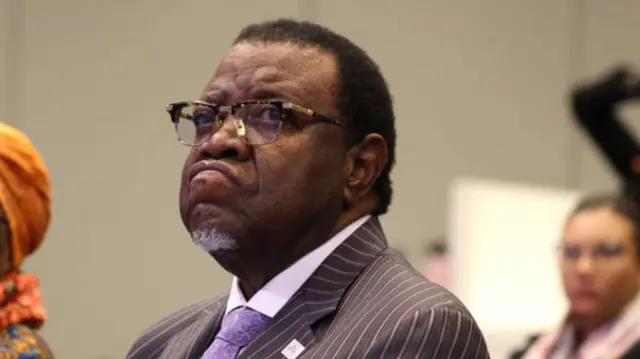 Image source, Getty Images
Image source, Getty ImagesHage Geingob says appropriate measures will be taken against those responsible
Namibian President Hage Geingob has condemned a “disturbing video” appearing to show soldiers who are part of the regional forces in Mozambique setting ablaze corpses.
The widely shared clip shows soldiers throwing a corpse on to the side of a bonfire of burning rubbish; one of them then throws liquid over the body and the flames spread.
Mr Geingob, who heads the security organ of the southern African regional group Sadc, in a statement said "we have noted the incident with regret”.
He said the leadership of the Southern African Development Community Mission in Mozambique (Samim) had launched investigations into the matter and would share the results once completed.
“I further wish to categorically underscore that [the regional bloc] Sadc does not condone acts reflected in the video and, once the investigations are completed, [it] will take appropriate measures,” he said.
Allow X content?
This article contains content provided by X. We ask for your permission before anything is loaded, as they may be using cookies and other technologies. You may want to read X’s cookie policy, external and privacy policy, external before accepting. To view this content choose ‘accept and continue’.
In the video, two men in army fatigues holding mobile phones appear to be filming the fire, and one of them has the South African flag on his uniform.
On Tuesday, the South African National Defence Force – whose troops are members of part of the regional force in Mozambique – condemned the incidents in the video and said it had already commenced investigations.
 BBC Monitoring
BBC Monitoring
The world through its media
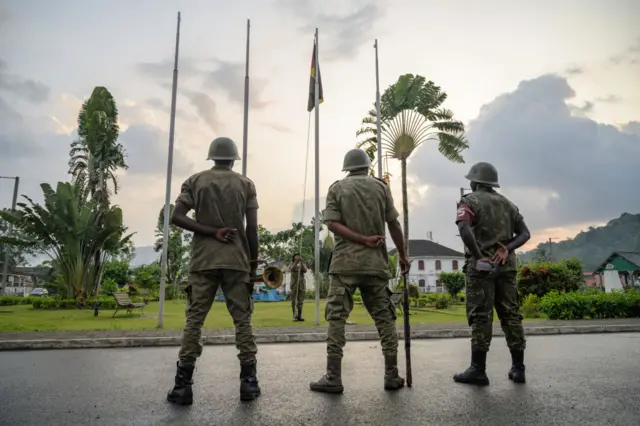 Image source, Getty Images
Image source, Getty ImagesThe opposition has also called for the sacking of the leadership of the armed forces
Sao Tome and Principe's opposition parties have announced that they will be tabling a motion of no-confidence against the government led by Prime Minister Patrice Trovoada over the handling of an attack on the army headquarters.
The announcement was made by the chair of the United Front of the Opposition Parties (FUPPO), Jorge Bom Jesus, who also called for the sacking of the leadership of the armed forces over the torture and killing of four suspects while in army custody.
On 25 November, a group of gunmen stormed the army headquarters in the capital, Sao Tome, in what the authorities described as an attempted coup.
Following the attack, Trovoada assured citizens that the army had succeeded in regaining control of the headquarters and that no blood had been shed in the process.
However, a day later, local media outlets published images of the tortured suspects surrounded by men in military fatigues - before and after their death - prompting widespread outrage and calls for a probe into the killings.
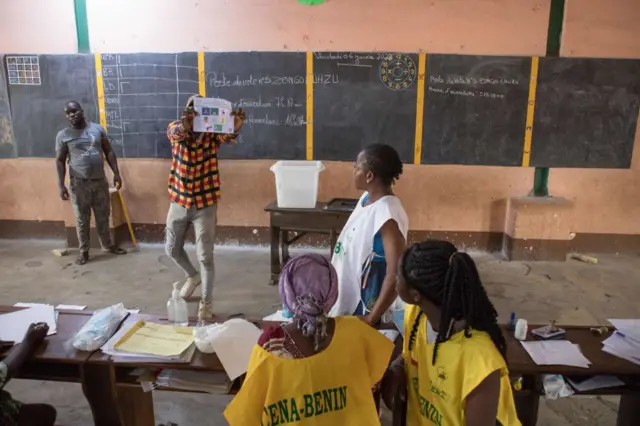 Image source, AFP
Image source, AFPFinal results of the Benin elections are expected later this week
The main opposition party in Benin, Les Democrates, has rejected provisional results from Sunday's parliamentary election.
Benin's electoral commission said the party won 28 seats in the 109-member parliament.
It would be the first time its members have been represented in the chamber in four years.
But a party spokesman accused the commission of falsifying results in order to minimise the opposition's parliamentary representation.
Allies of President Patrice Talon secured 81 seats in the vote.
Final results are expected later this week.
Benin's opposition was in effect barred from running in the 2019 legislative elections with most of Mr Talon's opponents jailed or exiled.
 Rhoda Odhiambo
Rhoda Odhiambo
BBC Africa health reporter, Nairobi
 Image source, Getty Images
Image source, Getty ImagesThe gonorrhoea bacteria is spread through unprotected sex
Researchers from the Kenya Medical Research Institute (Kemri) say a new strain of gonorrhoea, a sexually transmitted disease resistant to standard antibiotics, is circulating in the capital, Nairobi, especially among female sex workers.
Those behind the study blame misinformation as some sex workers, who are on a daily HIV prevention pill, believe it will also prevent them from sexually transmitted diseases and were not able to negotiate condom use.
More than 350 sex workers from one clinic in Nairobi, which reported high cases of gonorrhoea, took part in the study.
Three-quarters of the participants admitted to having unprotected sex with their partners and clients – as it pays more. Some of them said they slept with at least 29 clients in two weeks.
The researchers are calling on the Kenyan government to change the current treatment policy as well as advocate for more tests to determine how widespread the problem is in the country.
Gonorrhoea is one of the most common sexually transmitted diseases globally. More than 80 million cases are reported globally every year.
What is gonorrhoea?
 BBC World Service
BBC World Service
The French and German foreign ministers have arrived in the Ethiopian capital, Addis Ababa, to support the peace agreement that's ended two years of fighting in the northern Tigray region.
Germany's Annalena Baerbock, said the pair would be discussing the need for lasting peace and accountability, food security in the region as well as the wider partnership between the European and African Unions.
Tens of thousands of combatants and Tigrayan civilians died during months of brutal fighting, marked by numerous allegations of war crimes.
 Image source, AFP
Image source, AFPNigerian police regulations forbid unmarried officers from getting pregnant
A Nigerian court has struck out a police regulation that forbids unmarried female officers from getting pregnant, local media report.
In a landmark judgment, a judge ruled that the regulation, which calls for the dismissal of any unmarried officer who gets pregnant, was “discriminatory, illegal, null and void”.
It followed a suit by a sacked policewoman who challenged her dismissal on grounds of discrimination since her male counterparts are not dismissed in similar circumstances.
"The court finds and holds that the provision [of the regulation], which applies to unmarried women police officers getting pregnant while in service but does not apply to unmarried male police officers impregnating females while they are in service, is discriminatory,” Justice Dashe Damulak ruled on Wednesday.
The court also awarded her 5m naira ($11,100; £9,100) in compensation for the violation of her fundamental right to freedom from discrimination.
It however ruled that she could not be reinstated to the police service, as she had sought, as she was on probation at the time of her dismissal.
Tom Bayly
BBC World Service News
 Image source, Getty Images
Image source, Getty ImagesThe suspect is said to have injured six people at Paris's Gare du Nord rail station
Reports from France say a suspected attacker who stabbed and injured six people at Paris's Gare du Nord rail station on Wednesday has been identified as a Libyan national aged in his 20s who was due to be deported.
Police are still investigating the motive but are not believed to be treating it as a terror related.
Interior Minister Gérald Darmanin has praised the courage of two off-duty police officers who intervened to halt the attack.
The suspect was shot three times and taken to hospital with serious injuries.